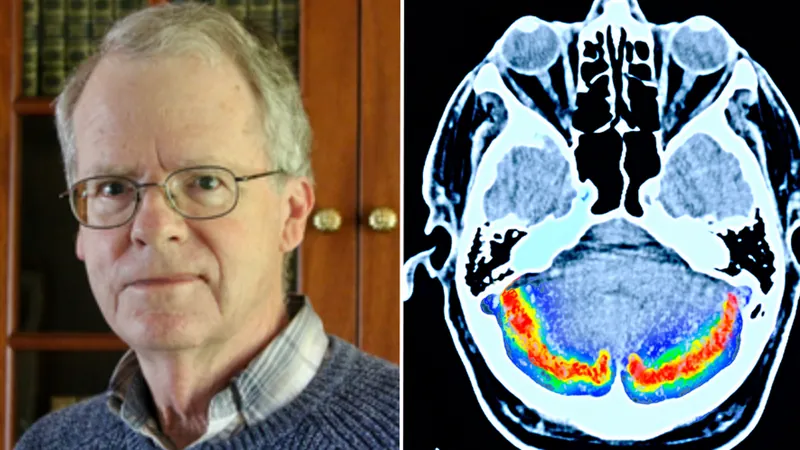
Eye-Opening Warning Sign for Alzheimer’s: A Doctor Shares His Personal Journey
2024-12-12
Author: Ting
A Startling Revelation
A startling revelation has emerged from the personal experience of a former neurologist who diagnosed himself with Alzheimer’s disease long before receiving an official confirmation. Dr. Daniel Gibbs, who painstakingly tracked his symptoms over the years, shed light on an often-overlooked warning sign that could indicate the onset of dementia: a diminished sense of smell.
Understanding the Impact of Alzheimer’s Disease
In the UK, approximately 928,000 individuals are affected by Alzheimer’s disease, which devastates memory and cognitive function, ultimately impairing the ability to perform daily tasks. Alarmingly, statistics from the Alzheimer’s Association suggest that this condition is implicated in the deaths of one in three older adults.
Dr. Gibbs’ Personal Journey
Dr. Gibbs, who began noticing changes in his olfactory senses in 2006 at the age of 55, quickly connected the dots. Drawing upon his extensive career in neurology, he explained that 'almost all people with Alzheimer’s have at least some impairment of smell,' though it often goes unnoticed because it develops gradually.
Initially, Dr. Gibbs hesitated to seek a formal diagnosis, as he was not exhibiting other classic symptoms of Alzheimer’s. However, his growing concerns prompted him to take proactive measures by undergoing genetic testing. The results revealed he carried two copies of the APOE4 gene, a significant predictor for Alzheimer’s. Research indicates that possessing this gene variant can significantly increase an individual’s risk, elevating it by 12 times when two copies are present.
The Role of the APOE4 Gene
It’s crucial to note, however, that while the APOE4 gene is a considerable risk factor, inheriting it does not guarantee dementia—many individuals live without ever developing the disease, according to the Mayo Clinic.
Lifestyle Changes After Diagnosis
Three years after receiving the unsettling genetic test results, Dr. Gibbs was officially diagnosed in 2015. Since then, he has embraced various lifestyle changes aimed at slowing the advancement of the disease. He has taken up Tai Chi, adopted a Mediterranean diet, and eliminated alcohol from his routine. Notably, the Mediterranean diet, rich in healthy fats and antioxidants, is known to have protective benefits for brain health.
Unexpected Advantages of Losing Smell
Remarkably, nearly a decade post-diagnosis, Dr. Gibbs has shared what he calls the 'unexpected advantages' of losing his sense of smell. 'I don’t get disgusted easily,' he remarked, mentioning that mundane tasks such as cleaning up after pets have become less of a chore. He humorously noted that he no longer spends money on expensive wine and has developed a greater sense of tolerance and patience, especially towards those who are homeless.
Nevertheless, he candidly admitted that one of the hardest aspects of losing his sense of smell is the impact on his enjoyment of food. 'Everything tastes pretty much the same,' he lamented, confessing that he particularly misses the aroma of bacon cooking in the kitchen.
Other Early Symptoms of Alzheimer’s
Dr. Gibbs also highlighted other early symptoms of Alzheimer’s disease that individuals should watch for, including increased anxiety, confusion, and poor judgment. The NHS further outlines that as the disease progresses, memory problems worsen, with patients struggling to remember familiar names and exhibiting obsessive or impulsive behaviors.
Severe Complications in Advanced Stages
In advanced stages, individuals may experience severe complications, such as substantial weight loss, loss of speech, and difficulty swallowing. If you or someone you know is concerned about memory issues or displays signs of dementia, consulting with a healthcare professional is strongly recommended.
Conclusion: The Importance of Vigilance
Dr. Gibbs’ story serves as a powerful reminder of the importance of being vigilant about subtle health changes and the potential implications they may carry. As the battle against Alzheimer’s continues, sharing personal experiences and insights can create a collective awareness that may one day lead to breakthroughs in understanding and combating this devastating disease.



 Brasil (PT)
Brasil (PT)
 Canada (EN)
Canada (EN)
 Chile (ES)
Chile (ES)
 España (ES)
España (ES)
 France (FR)
France (FR)
 Hong Kong (EN)
Hong Kong (EN)
 Italia (IT)
Italia (IT)
 日本 (JA)
日本 (JA)
 Magyarország (HU)
Magyarország (HU)
 Norge (NO)
Norge (NO)
 Polska (PL)
Polska (PL)
 Schweiz (DE)
Schweiz (DE)
 Singapore (EN)
Singapore (EN)
 Sverige (SV)
Sverige (SV)
 Suomi (FI)
Suomi (FI)
 Türkiye (TR)
Türkiye (TR)